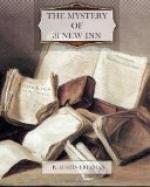“I should overhaul him thoroughly,” I answered.
“Why? What would you expect to find?”
“I don’t know that I should start by expecting to find anything in particular. But I should overhaul him organ by organ and function by function, and if I could find nothing abnormal I should have to give it up.”
“Exactly,” said Thorndyke. “And that is just my position and my line of action. Here is a case which is perfectly regular and straightforward excepting in one respect. It has a single abnormal feature. And for that abnormality there is nothing to account.
“Jeffrey Blackmore made a will. It was a well-drawn will and it apparently gave full effect to his intentions. Then he revoked that will and made another. No change had occurred in his circumstances or in his intentions. The provisions of the new will were believed by him to be identical with those of the old one. The new will differed from the old one only in having a defect in the drafting from which the first will was free, and of which he must have been unaware. Now why did he revoke the first will and replace it with another which he believed to be identical in its provisions? There is no answer to that question. It is an abnormal feature in the case. There must be some explanation of that abnormality and it is my business to discover it. But the facts in my possession yield no such explanation. Therefore it is my purpose to search for new facts which may give me a starting-point for an investigation.”
This exposition of Thorndyke’s proposed conduct of the case, reasonable as it was, did not impress me as very convincing. I found myself coming back to Marchmont’s position, that there was really nothing in dispute. But other matters claimed our attention at the moment, and it was not until after dinner that my colleague reverted to the subject.
“How should you like to take a turn round to New Inn this evening?” he asked.
“I should have thought,” said I, “that it would be better to go by daylight. Those old chambers are not usually very well illuminated.”
“That is well thought of,” said Thorndyke. “We had better take a lamp with us. Let us go up to the laboratory and get one from Polton.”
“There is no need to do that,” said I. “The pocket-lamp that you lent me is in my overcoat pocket. I put it there to return it to you.”
“Did you have occasion to use it?” he asked.
“Yes. I paid another visit to the mysterious house and carried out your plan. I must tell you about it later.”
“Do. I shall be keenly interested to hear all about your adventures. Is there plenty of candle left in the lamp?”
“Oh yes. I only used it for about an hour.”
“Then let us be off,” said Thorndyke; and we accordingly set forth on our quest; and, as we went, I reflected once more on the apparent vagueness of our proceedings. Presently I reopened the subject with Thorndyke.




